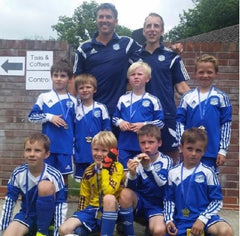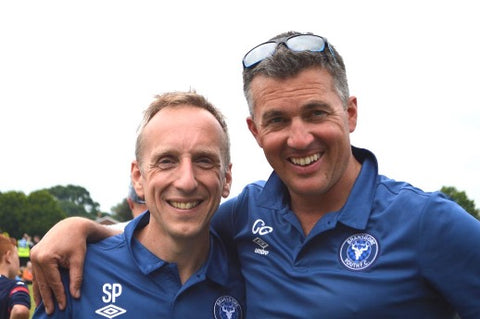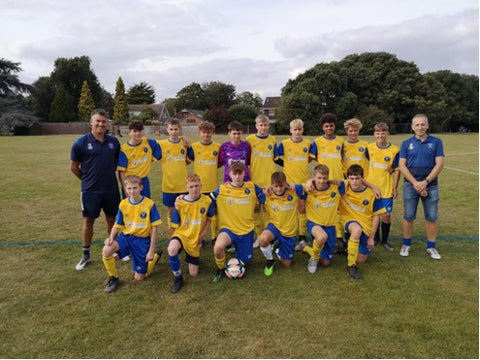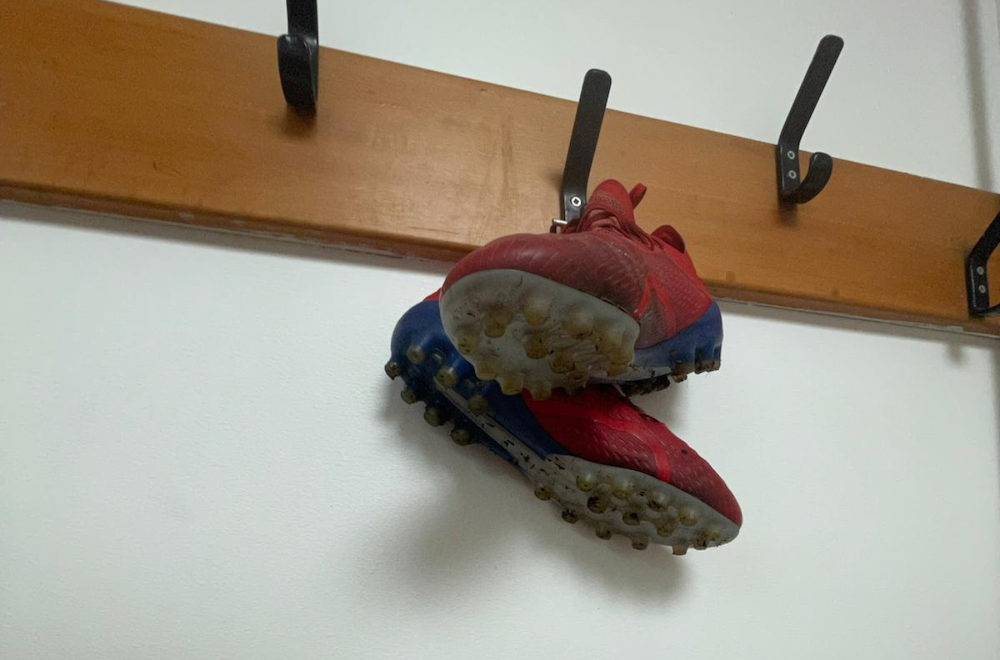What to do when your teenager becomes too old to continue playing in his club team?
Hanging up their football boots for the last time - it can be an emotional and unsettling experience for both teenagers and their parents. After years of football punctuating weekends, after school activities and all the washing / admin in-between, the finality of finishing youth football at age 16 can leave feelings of ‘what next’? Our latest blog explores what teenagers can do beyond their grassroots club.
We also chat to a parent coach and a team manager who are also hanging up their boots this season and finally getting their weekends back!
At Laceeze we know more than most that football is an essential part of many kids' lives, and it can be a difficult transition when they reach the age of 16 and their grassroots’ football career comes to what seems like a rather abrupt end. For many, football has structured their lives since they laced up their boots (sometimes with a little help from us!) and played in their first matches.
Fortunately, there are many exciting options for kids to explore after they have finished playing football at this amateur level. However the choices aren’t always obvious or that accessible so we dug a little deeper to help you make the choice that’s right for your family.
Youth football focuses on developing the skills and abilities of young players, from the ages of 6 to 16. It provides a safe and fun environment for children to learn about the game and develop their skills. However, it is often seen as a stepping-stone towards professional football, with some players leaving grassroots when they turn 16 to pursue their chances at semi professional clubs. Not all players are that lucky.
Football is an incredibly popular sport among kids and young adults. It provides a great opportunity for them to learn important life skills such as teamwork, communication, and leadership. However, once they finish their grassroots football journey, many of them struggle to find the right path that will allow them to use the skills they have acquired. As only 1% of teens will play for a professional club, we wanted to find out what options are available for the majority of players wanting to continue to play the sport they love.
#1 Research your nearest u18s Club
If you’re lucky, there might be an u18s club in your area. If you can find a local club with an U18's team or reserve team who play in an U18's league, this is a more gentle transition into adult football. Effectively your son or daughter will enjoy two more years of playing football, without the pressure of playing with much older players. Playing at this level can also give them the potential to move into the local club’s 1st team.
Your teenager’s school or college may also offer the opportunity for them to play football against their peers from age 16-18. Laceeze Founder, Emma Burke, comments; “My son finished his grassroots u16 football journey last year but luckily has remained in his school football programme which has enabled him to continue against opposition the same age as him.”
#2 Find a “casual football” group
Joining a local sports club is a great way to stay connected with the game of football after finishing at grassroots level. Not only does it provide an opportunity to hone your skills and practice the game, but it also provides a social outlet and helps build strong relationships with other players.
Local sports clubs, especially those with more of a casual (just for fun) approach, are a great way for teens to stay active, both physically and mentally. It can be an excellent source of motivation for players who have just finished playing at the grassroots level. Players can learn new tactics, strategies, and techniques from experienced coaches and other players in their team. They can also get access to better training facilities than what they had during their grassroots years.
Joining a local sports club also gives players an opportunity to develop their leadership skills by taking on responsibilities such as captaincy or coaching roles within the team. It is also beneficial for those looking for career opportunities in professional football as many clubs provide job placements or internships that could help them take the next step in their football journey.
The FA have a handy guide called “Find Football” that helps you search for a club near you, from more relaxed ‘casual football’ through to more competitive ‘club football’ options.
#3 Enrol in an Education Programme
A structured football Education Programme is ideal for anyone looking to make the step from the grassroots to the semi-professional or professional game.
These courses are often a 2-year agreement between a Club and an Academy Player and provide a full-time football development and learning programme. There has been a rise in popularity of more formal education programmes for football so it’s worth researching the best one in the location you need.
Sam Lee comments on his son Cohen’s progression from youth grassroots football that; “with the uplift of education programmes at football clubs, it is becoming harder for players that are not doing them to break into clubs running those programmes.”
Steve Cuss, Head of Community for the AFCB Football Education Programme, comments on the AFCB website that; “We offer full-time education and training to males and females aged between 16 and 19 years old. This academic programme provides young sports enthusiasts with the chance to combine academic studies with football development. The course allows students to study for the NCFE Level 3 Extended Diploma in Sport and Physical activity, and on completing of the course students will attain the equivalent to three A-Levels or an NCFE Level 2 Diploma in Sport. The NCFE programme provides introductory skills to start a career in sport or progress within the employment sector. Our Programme will provide students with comprehensive and quality training that will help make outstanding applicants for employment, further education both university and apprenticeships.”
To find out more about the AFCB Football Education Programme visit their website

Spotlight on two parent volunteers hanging up their boots for the last time…

As well as the affect on the children, we also wanted to know how coaches felt when their grassroots journey comes to an end. We interviewed Chris Gollings, father of five children and a coach for Bransgore Youth Football Club for the last 9 years.
“We have just played our last ever league game as a team after 9 years training and playing football together.
At under 8's we only had 5 lads and fortunately it was just a 5-a-side game. The manager and myself (coach) have stayed with the boys for 9 seasons and like most teams it has had its ups and downs. We started as one of the weaker teams and as the seasons progressed there were at one stage 3 leagues of 12 teams!
As the boys get older the games start heating up, both physically and technically, and there is a drop off of players and teams. The lads also find other distractions!!
In the last season we were one league of 10 and our team narrowly missed out on a runners’ up prize coming third overall.
But whatever position we finished the team were the winners in making it all the way to the end - and having a lot of fun on the way.
It brings mixed emotions when we have only one presentation before it is all over. A sense of relief maybe for managers and coaches as the weekends become freed up for other hobbies, a sense of loss at not having the role of coach, but moreover a responsibility to help the players find other options as they move into the sixth form or apprenticeships.
Not all clubs are able to host an under 18s or colts team but some bigger clubs will have these teams and promote pathways into their under 23s or adult sides.
Locally we have managed to find a few clubs that were hosting trials for their under 18 teams, and had training sessions, arranged trial games, and gave talks about the adult pathways.
Several of our players have attended these trials and some already have invites. The football trials seem to clash with GCSE revision and exams but the boys have not seemed to bothered by this!!
Even larger clubs will have academies, where players may be looking at becoming paid for some non-league football action in the future.
Whilst none of our players considered this option we know lads who were talented enough to be considered.
One of the values we held throughout the football seasons was enjoyment.
There was a lot of competition but also a lot of fun, and we managed to keep small enough that we were never too 'selective', and more 'inclusive' enrolling all those who wanted to join.
We have encouraged the boys to continue their football wherever they will enjoy it most, whether that is with a large club, a local under 18s team, with mates playing in 5-a-side leagues, or just with friends down the park!
So to all the boys who were a part of our team and for those reading this article... keep playing ... and keep having fun! To our hard working Manager - Simon (pictured here to my left), thank you for everything and I’ll see you at the pub!”

Simon Philps (left)
Manager, Bransgore Youth Football Club U16s
Chris Gollings (right)
Coach, Bransgore Youth Football Club U16s

Bransgore Youth FC U16's (2023)
Simon Philps, Chris’s partner in crime on the football field, tells us how he feels at the end of this particular era…
“I’ve just completed 9 seasons as coach of my son’s football team, having taken them from U8s right through to U16s. I’ve had a large amount of help from another parent (Chris) who has assisted for the whole duration. We’ve had other help for a season here and there, but the two of us have travelled the whole journey together.
It leaves me with mixed emotions. I won’t miss marking out pitches and white lining them, trying desperately on a Friday/Saturday to find a ref or dealing with BYFL and Hampshire FA who make the role harder than it needs to be… What I will miss is the actual coaching, implementing training sessions that the players enjoy and learn from in equal measures. I’ll miss the reward of matchdays when something you’ve been working on is replicated in a game.
We’ve watched these players grow from boys to young men and that added an additional challenge and responsibility. It also reinforced what I already knew - sport is extremely important for mental health as well as physical development.
Suddenly the youth journey comes to an end and it’s time to think about what is next. What is clear is that there is has been no guidance or signposting from the FA and it’s easy to see why some of them may end up not playing for a while. They are at different levels when it comes to potentially playing for a county club, either due to ability or how serious they want to take it.
I’ve worked hard to find options for them all and am still looking other routes that I can share with them to try and keep them all involved. I’m still playing in a competitive 6-a-side league and also 11-a-side with a team on Sundays, because I still love the game.
I only hope they all still feel like that in 30 years too..”


0 comments